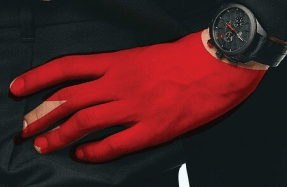


ON THE ROAD
The air-raid siren sounded again through the defiant city, but William McNulty refused to be bothered by it. After a long morning of meetings in Kyiv with Ukrainian partners in need of medical tourniquets and coldweather clothing, the man had earned an afternoon nap. The air flowing through the hotel room’s open window nipped of brittle autumn, and sunlight was leaking through gray clouds; winter, as the Ukrainians liked to quip, was coming.
Fuck it, McNulty thought. The chances of getting hit by a drone strike in a city of three million people seemed low. A U. S. Marine veteran from Chicago who’s served in Iraq and done humanitarian work in dozens of conflict and natural-disaster zones, he’s grown numb to the frequent sirens that are now a mainstay of life in Ukraine. Since Russia’s latest invasion began in February of last year, he’s traveled throughout the country, by train and van, to rural villages and the front, delivering supplies to those fighting at democracy’s edge. His nonprofit group, Operation White Stork, makes no quibble about supporting Ukraine in the war. He’s had his fill of messy wars and ambiguous purposes. He believes this is it, the real deal, the righteous cause that people of action always not-so-secretly crave.
Even altruists need sleep, though. So McNulty, forty-five, lay on his bed, shut his eyelids, and focused, as much as he could, on rest. Then came a strident hum. It cut through the sirens, then over them, braying and obnoxious, like a great lawn mower in the sky. It kept nearing and nearing. Then it passed directly over McNulty’s hotel.
“That was enough for me,” he recalls days later, as we drive somewhere along the black ribbon of highway between Kyiv and the port city of Odesa in the far south. He identified the noise as the engine of an Iranian-made Shahed kamikaze drone, one of many Russia has used to terrorize Ukraine’s civilian population over the past few months. He dared move only when the noise had faded out and there was nothing but air-raid siren again. To McNulty’s fortune, another target had been selected in Kyiv that afternoon in mid-October. “I headed down to the shelter room. Then we went out and ate at a nice Italian place.”
In the language of this new war, McNulty is a “volunteer,” one of roughly tens of thousands of internationals and local Ukrainians who’ve devoted themselves to supporting the resistance against the Russian military. The roles they play vary widely, from humanitarians like McNulty to socialmedia celebrities fundraising for military units. There are brash foreign fighters and humble food drivers and furtive gunrunners and ancient babushkas knitting camouflage ghillie suits in community gyms. Some are volunteers in the literal sense, burning through their savings to subsidize their work. Some earn a small stipend; still others are profiteers who see nothing wrong with benefiting financially amid a nation’s war for survival. It’s proven dangerous work, too—in January, two British volunteers were killed attempting to evacuate an elderly civilian. For all the differences in type and approach, the volunteer movement is unified by a core belief that this is a fight worth fighting, that Ukraine is worth defending.
It’s a belief I happen to agree with. In late February 2022, I joined two friends, fellow combat veterans, in Lviv, in western Ukraine. We spent two weeks training a group of civilians in combat basics and self-defense. It was a frightening and thrilling and inspiring experience, and then we returned home to America, to our families, as the war progressed and endured. Others went forward. With interest and perhaps a bit of envy, I watched the volunteers of Ukraine coalesce and organize through the summer and into the early autumn. Then, this past fall, I decided to go back, for three weeks, joined by one of the other trainers from February, Marine veteran Ben Busch. We wanted to see the volunteer ecosystem that’s developed and to meet some of the people who’ve upended their lives for it.
In the White Stork van on the road, McNulty turns to look at me. He has stony blue eyes and the shaky, aid-worker gaze of those






